The Quiet Evolution of Joe Kennedy III
Four years after becoming the first Kennedy ever to lose an election in Massachusetts, JK3 is ready to talk—about his 2020 defeat, his divisive uncle, and how the Democratic Party desperately needs a radical reinvention.
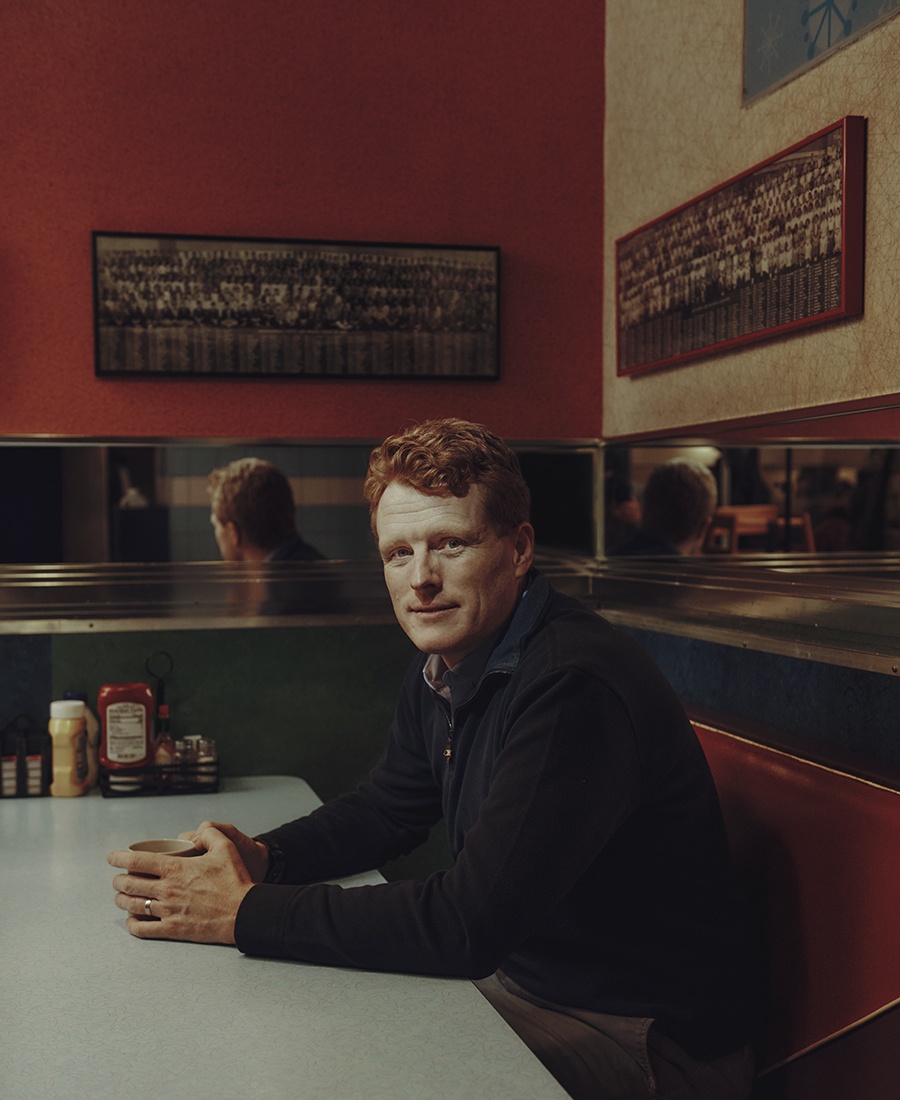
Joe Kennedy III takes a seat at one of his favorite hangouts, Johnny’s Luncheonette in Newton. / Photo by Tony Luong
If all had gone according to plan, he would, on a day like this one, be sitting in his U.S. Senate office in DC, laying the groundwork for his 2026 reelection campaign. Or even—if you prefer the Camelot-redux version of the narrative—be on the phone, making calls to party insiders in South Carolina and New Hampshire and Iowa, chatting up a 2028 presidential run. Instead, Joe Kennedy III—former congressman, former future of the Democratic Party, current politician in exile—is hunkered down in his Seaport office, talking about the man who’s soon to be the most powerful public health official in America, a.k.a. his nutty Uncle Bobby.
“He is a charming, charismatic, engaging, funny, smart, lovely guy,” Kennedy says, pausing briefly before he adds, “with whom I passionately disagree about a lot of things.” He smiles. The disagreements—starting with RFK Jr.’s vaccine denialism and COVID quackery, ending with his full-on embrace of President Donald Trump—are so obvious and so deep they don’t really even need to be said.
It’s a Wednesday morning in early December, and I’m chatting with Kennedy—JK3, as the social media universe often calls him—for the fourth time in four weeks. That the red-headed grandson of the original RFK has chosen to take the high road about RFK Jr., Trump’s in-your-face choice for Secretary of the Department of Health and Human Services, isn’t really surprising. As I’ve seen and heard firsthand during our conversations, JK3 is not only unfailingly polite but also respectful of elections and the will of the people. Which means he sees no reason to be anything other than generous. “I wish him and his family all the success in the world,” he says, “and however I can be there for them as a family member, that’s certainly what I’d like to do.”
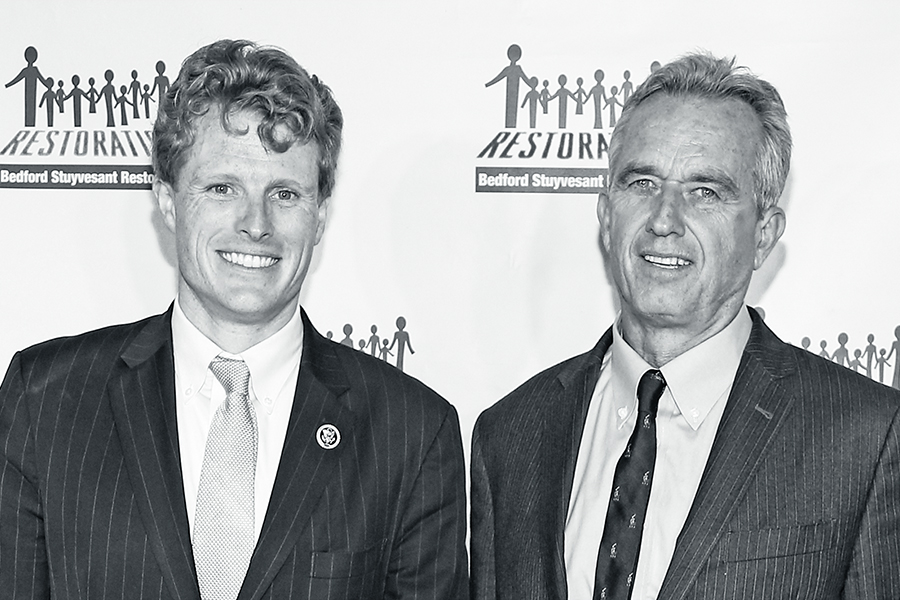
The former congressman with his uncle, Robert F. Kennedy Jr., in 2016. / Photo by Bennett Raglin/Getty Images
There could be no clearer evidence of the current bizarro state of American politics than RFK Jr.’s ascent to real power. He might, in fact, be charming, engaging, charismatic, and all the rest, but he’s also a conspiracy theorist, a serial philanderer, an alleged sexual assaulter, and a dude with a weird sense of humor. (He revealed during last year’s presidential run that a decade ago he’d dumped a dead bear cub’s carcass in New York’s Central Park, just for laughs.) In a previous age, many of those things would have likely disqualified him from holding big time government office; today, at least in the eyes of Trump and MAGA World, they help make him The Right Man for the Job.
RFK Jr. is hardly the only Kennedy, of course, whose behavior has warranted an eyebrow raise or an eye roll over the years. Particularly to a younger generation, the once-mythic Kennedys have, in many ways, become the American equivalent of the British royal family: They’re a clan as well known for tragedy and tabloid-esque behavior—affairs, cover-ups, drug overdoses, sexual assaults, even support for destructive eco-activism (a new addition to the canon, courtesy of RFK Jr.’s sister Rory)—as they are for any serious contributions to the national good. Which—to be fair—has always been part of what’s made Joe Kennedy III stand apart: In a family of questionable characters, he was the square one, the straight-arrow teetotaler around whom there’s never even been a whiff of personal scandal. Not that it’s done him much good.
Indeed, when last we saw JK3, he was—not to be indelicate—getting his ass kicked by Ed Markey in the 2020 Democratic Senate primary. The result—Markey won by 11 points—was stunning not just because it made him the first Kennedy ever to lose an election in Massachusetts, but because he was, until that campaign, every bit a rising Democratic star. The dynamic young four-term congressman had done everything right: earned the respect of his colleagues, raised oodles of money for candidates across the country, and been chosen to deliver his party’s response to Trump’s 2018 State of the Union Address. Then, just like that, all the luster and promise disappeared. At best, his decision to challenge Markey was seen as a massive political calculation; at worst, it represented the end of the nearly eight-decade-long Kennedy political dynasty, with voters seemingly saying: Thank you for your service. Now please take your touch football, your scandals, and your astonishing sense of entitlement and find something else to do.
Over the past four years, Kennedy, now 44, has, in fact, found plenty to do. In 2021, he joined Citizens Energy Corporation, the nonprofit organization his father, former Congressman Joe Kennedy II, founded in 1979, and became president in 2023. He’s gotten involved with other nonprofits and launched an advocacy group of his own. Most notably, he became the Biden Administration’s Special Envoy to Northern Ireland, focusing on economic development. If observers wondered whether all of that activity was just a way of keeping busy until another political opportunity—say, Markey retiring—came along, well, that door slammed shut this past fall when Markey, age 78, announced he’ll run next year for a third Senate term. In exile, or at least under the radar, JK3 would remain.
He says this is fine by him. The 2020 race was more brutal than he’d anticipated, and he doesn’t seem anxious to put his young family through another campaign any time soon. But that’s not to say he’s disengaged from politics. Kennedy is among those who believe the Democratic Party is doomed to permanent minority status nationally unless the current version of its base—well-educated progressives like himself, who’ve generally done fine economically in recent years—wake up and understand the disconnect that’s developed between them and America’s working class, for whom the past four decades have more or less been a disaster. JK3, in fact, has been making this point for quite a while, and the nonprofit he launched in 2021, the Groundwork Project, aims ultimately at helping Democrats regain some of their lost status in red America.
“We have seen over and over and over again that it’s not a viable strategy to gin up turnout in major urban centers but lose rural America 90–10,” he says. “A massive swath of the American public is telling us, over and over again, ‘We’re not buying what you’re selling.’ And yet we keep selling the same thing.”
It’s an intriguing message, and JK3 is undeniably passionate about delivering it in whatever way he can. But in an era of deep distrust, when a new generation is questioning nepo-baby privilege and political dynasties, can even a reimagined Kennedy legacy find its place? Or have Bostonians finally outgrown Camelot?
“A massive swath of the American public is telling us, over and over again, ‘We’re not buying what you’re selling.’ And yet we keep selling the same thing.”
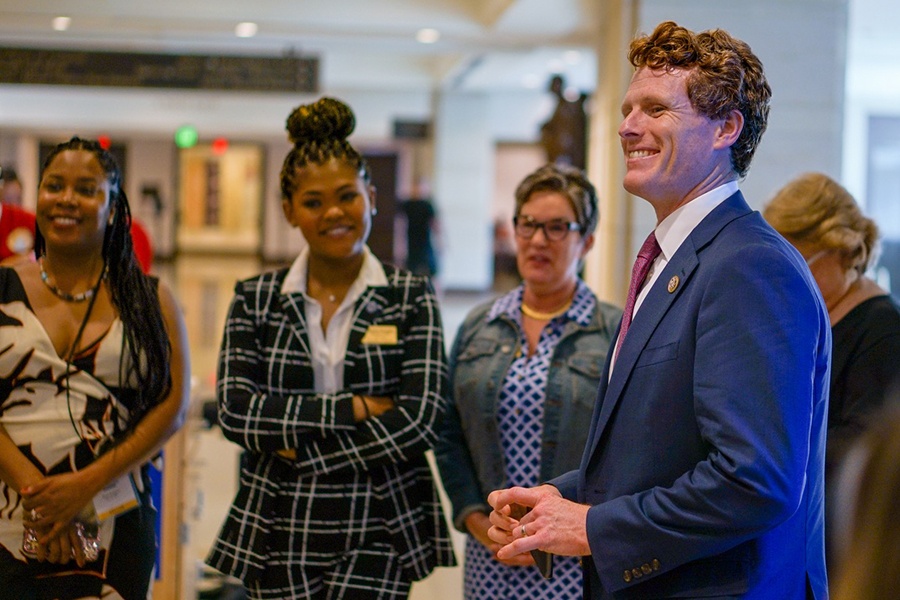
Since leaving office, Joe traveled to DC to support his Groundwork Project, which helps local community organizers. / Photo by Myles Person
JK3 and I first met in person in mid-November, at an event in Washington, DC, celebrating the 26th anniversary of the Good Friday Agreement, the U.S.-brokered accord that finally brought an end to “the Troubles” in Northern Ireland. The event—attended by a hundred or so people at the U.S. Institute of Peace, across the street from the U.S. State Department—began with prerecorded video remarks from former Maine Senator George Mitchell, now 91, the first U.S. envoy to Northern Ireland, who did so much to make the truce a reality. When the video ended, Kennedy, dressed in a conservative gray suit and blue tie, was introduced and stepped up to the podium.
“I’ve learned a lot over the course of the past couple of years,” he began. He stopped, then offered off-handedly: “You’d think one of the first things would be don’t follow George Mitchell in a speaking program.” He laughed. “To say nothing of the position of Special Envoy.”
JK3 isn’t a particularly dynamic speaker, but he has a gentle, self-deprecating wit and a fresh earnestness, both of which can be appealing. People close to him politically say retail campaigning is a strength; he connects with people, engages them.
During his remarks that day, he noted that Northern Ireland’s progress over the past quarter-century hasn’t always gone in a straight line, but he praised the country’s people for having, as he put it, “gotten on with it.” More important, he noted the willingness of both sides in the conflict—the loyalists and nationalists—to put aside their differences in order to create a better future. “Folks, from someone who’s had the honor and privilege of serving in Congress and traveling to many places around the world, I challenge you to find another place the world over that has done a better job of wrestling with issues of identity and past, and not ignoring them, but finding the space to protect them, recognize them, while also doing the hard work of creating community.”
JK3 became Special Envoy to Northern Ireland in late 2022, an appointment driven, no doubt, by his family’s roots in the Emerald Isle. Although the position is technically part-time—there’s a cap on the number of days the Special Envoy can work, and limited staff and budget—Kennedy made 10 official trips across the ocean, meeting with people there while trying to get U.S. businesses and institutions interested in investing in Northern Ireland’s future. “I was aware of the name, as are most people in the north of Ireland, and I thought that could be useful,” says Jayne Brady, a Northern Ireland government official who’s worked closely with Kennedy over the past couple of years. “But what I hadn’t anticipated was his intellect and his ability to understand the economy, investment, innovation, as well as his knowledge of how to actually engage with the region. His view was that whatever programs or approaches we were taking, they should be informed by the people on the ground.”
JK3’s approach to the Special Envoy job—thoughtful, patient, practical—was also, observers say, how he approached his role on Capitol Hill. Congresswoman Katherine Clark, who was first elected to represent Massachusetts’ 5th district in a special election in late 2013, says that when she arrived in the House, people told her to pay attention to Kennedy, who’d started representing the 4th district (he succeeded Barney Frank) the year prior. “Everywhere I went, Democrats and Republicans would say, ‘You’re the new member from Massachusetts, and you should model yourself on Joe Kennedy,’” she says. “Joe just has an ability to relate to people, to talk to people, to be a really good listener, and it really earned him respect on both sides of the aisle.” (Clark notes that she’d actually first met JK3 eight years earlier, when he worked on Ted Kennedy’s final Senate campaign. “Within a few days, Joe had memorized everyone’s coffee orders,” she remembers.)
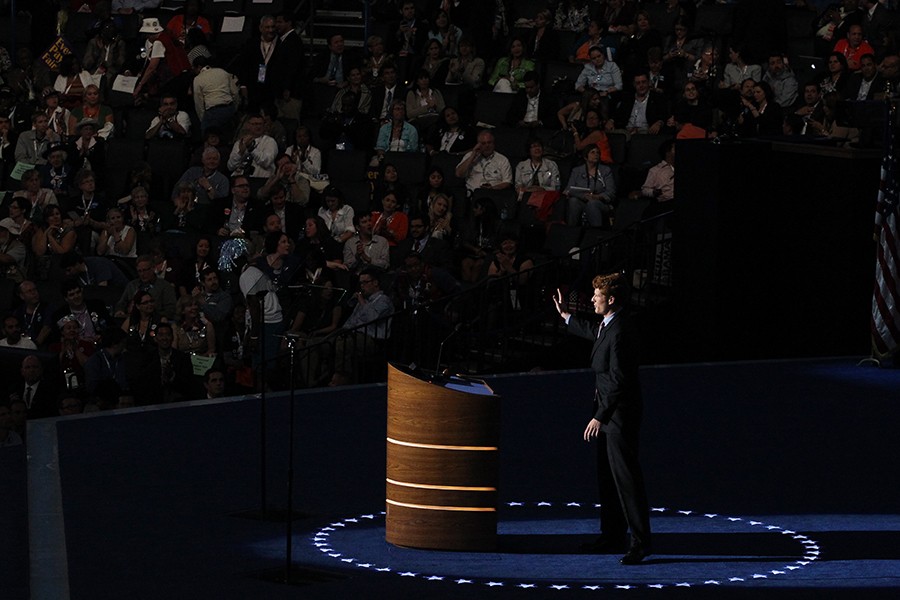
Kennedy’s influence was felt as far back as the 2012 DNC, where the then-candidate for Congress took the stage. / Photo by Streeter Lecka/Getty Images
In Congress, when it came to the issues, Kennedy was an interesting blend of old and new. On the one hand, he operated very much in the tradition of his grandfather, his Uncle Teddy, and his father, advocating for society’s underdogs. He championed bills focused on mental health, trans people, and civil rights, while paying particular attention to the economic challenges facing more blue-collar parts of his district. At the same time, he talked about topics—as he continues to talk about topics—using the particular academic-flavored language favored by his own tribe of young-ish, well-educated, social-justice-oriented progressives. In our conversations, he talked often (as he did at the Good Friday Agreement event) about “identity.” He made reference to “systemic racism” and “privilege.” He spoke of people being in “community.”
His State of the Union response in 2018, broadcast from a vo-tech high school in Fall River, one of those blue-collar communities in his district, had a similar old/new quality to it. Dressed—very much on brand for a Kennedy—in shirtsleeves and a tie, he began by denouncing the way Trump had pitted Americans against one another, and he rejected what he called the “false choices” the president was presenting. Then, even as he uttered a few lines in Spanish and gave shout-outs to contemporary causes like Black Lives Matter, #MeToo, and same-sex marriage, he offered a somewhat retro message that was, well, Kennedy-esque in its idealism and challenge to the country.
“The strongest, richest, greatest nation in the world shouldn’t leave anyone behind,” he said. “We choose a better deal for all who call this country home. We choose the living wage, paid leave, and affordable childcare your family needs to survive.
“We choose pensions that are solvent, trade pacts that are fair, roads and bridges that won’t rust away, and good education you can afford…
“We choose an economy strong enough to boast record stock prices and brave enough to admit that top CEOs making 300 times the average worker is not right.
“We choose Fall River.”
The speech wasn’t without glitches. Twitter giggled at the excessive amount of lip balm JK3 had applied, which glistened in the TV lights. Others snickered that he looked like the junior class president addressing a school assembly.
But all in all, the reviews were decent, and in the weeks and months that followed, Kennedy hit the road, campaigning and raising money and generally being a Kennedy on behalf of numerous Democratic candidates around the country. What American politician, after all, wouldn’t want the support and embrace of a rising young member of the country’s most storied political family?
Actually, why limit ourselves to the United States? As Northern Ireland’s Jayne Brady told me, “Even in my own family, there was a JFK bust on our mantel.”
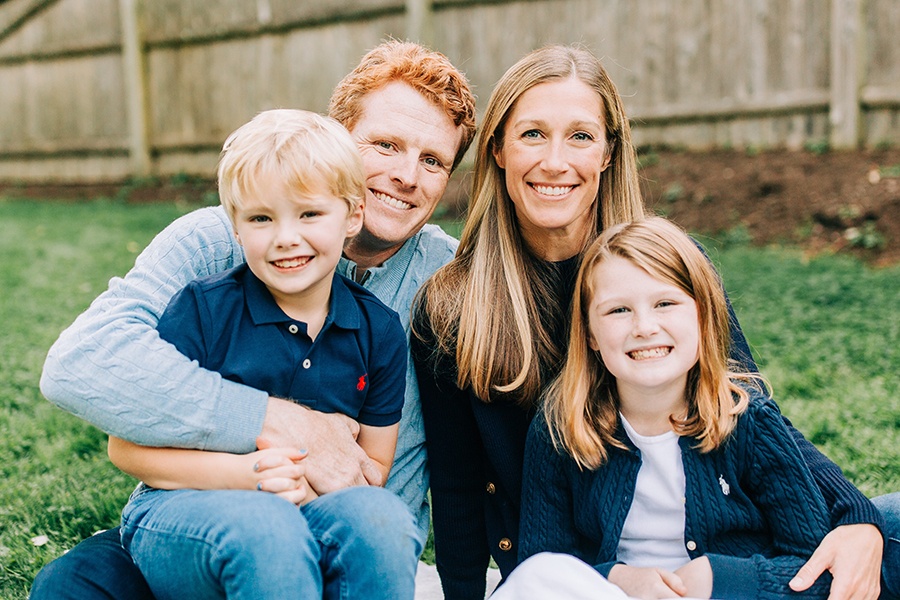
Since leaving office, Joe Kennedy III has spent more time with his family. / Photo by Sara Grayson Photography
JK3 lives in Newton with his wife, Lauren, a fellow Harvard Law grad who cofounded the childcare advocacy nonprofit Neighborhood Villages, and their two children. His nine-year-old daughter, Kennedy tells me, has reached the age where she’s starting to understand her family is not quite like everyone else’s. “My daughter will mention things to me sometimes. ‘How do they know who you are?’ Or, there’s some guy looking at a picture of me on his phone—‘Why do they do that?’”
It’s a feeling he remembers from his own youth. When I ask—half-jokingly, but, you know, half-not—if there comes a point when every Kennedy child sits down for a talk about Who You Are, he scoffs: “No.…” It’s an awareness, he explains, that comes by osmosis.
He remembers being six, seven, eight years old and playing touch football on the lawn in Hyannis Port—okay, we can stop for a moment and let that image sink in—and being aware of people with telephoto lenses taking pictures. Or eating breakfast and having to draw the blinds so no photos could be snapped. Or walking down to the dock for a swim and seeing photographers in the water, trying to get pictures of his cousin John Kennedy Jr.—then in his “Sexiest Man Alive” period—with his shirt off. JK3 doesn’t say this in a complaining way, or boastfully. It was just…life. “You just knew that, for some reason, somebody cared,” he says. “But then you have to figure out how you’re going to live your life as best you can, understanding that your highs are going to be exaggerated, and your lows are going to be exploited. It ain’t bad or good; it’s just the way it is.”
If fame is one part of being a Kennedy, another—at least if you’re interested in politics—is that heavy, mantel-worthy legacy the name brings with it. I ask JK3 if he ever made a point of studying what his grandfather and great-uncles accomplished, or what they came to represent. “That’s a great question,” he says. “I don’t know if I have a good answer for you. I never formally studied it because”—he stops, and there is a several-second pause before he offers what is either a confession or just a fun fact. “I’ve only ever read one book on my family,” he says.
It was after he returned from the Peace Corps in 2006 (he served two years in the Dominican Republic) and had signed on for what would be his Uncle Teddy’s last Senate race. Someone on the campaign told him that if he was going to work on the race, he needed to know something about the candidate—and gave him a book. “Other than that, I have deliberately never read one,” JK3 says. “And, I say this with respect, I never read one because as much as these folks are historical figures, they’re also family members. And I never wanted a writer or publisher or editor to get between me and them. I didn’t have the chance to meet him, but I would rather have the relationship that I have with my grandfather be the one I absorbed from my grandmother and my dad and his siblings. Not one that I have to triangulate through different people with different agendas.”
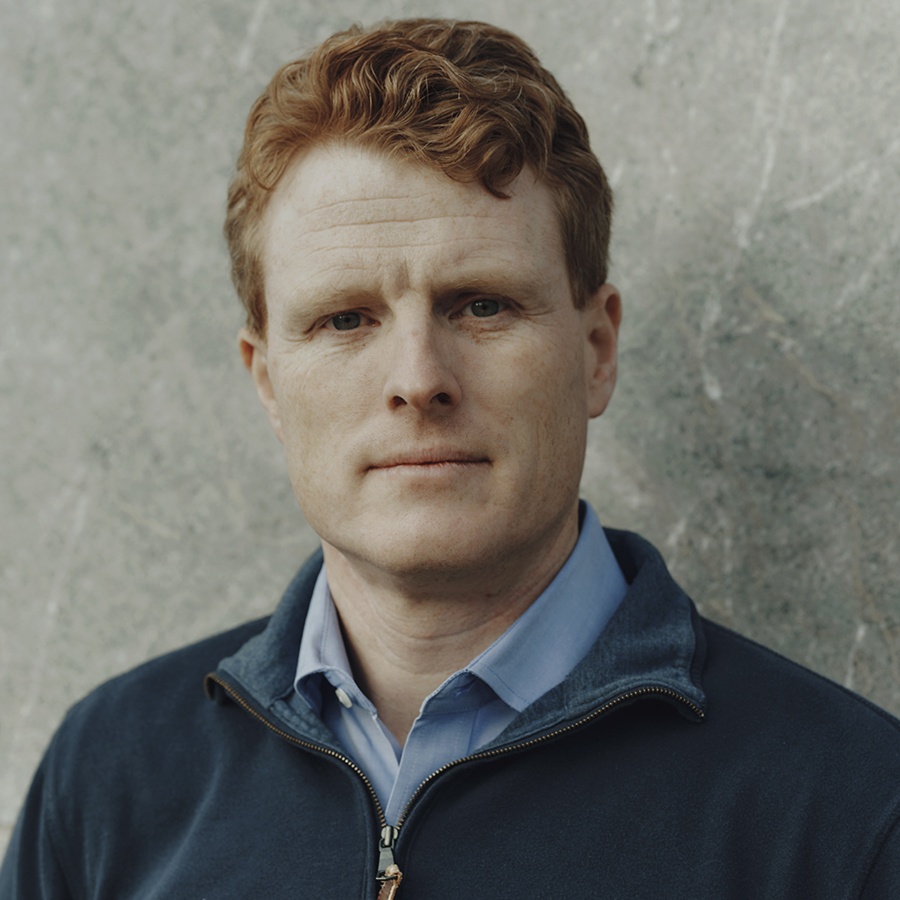
Joe Kennedy III says he hasn’t fully ruled out another run for office. / Photo by Tony Loung
It’s hard to believe that both aspects of the Kennedy legacy—the fame part, the legacy part—didn’t play some role in JK3’s ill-fated decision to challenge Ed Markey in 2020. But contrary to what some people have speculated, Kennedy says the run was not something he’d long contemplated; it only came about after a group of political insiders approached him about it in late summer 2019.
There was, to be sure, a certain logic to it. Though Markey had spent more than 40 years in Congress—including seven years in the Senate—he wasn’t particularly well known even within Massachusetts. As one politico told me, “He was a weak incumbent.” At the same time, the previous couple of years had seen several dynamic young progressives—Alexandria Ocasio-Cortez and Ayanna Pressley, to name two—take on and defeat entrenched older Democratic incumbents. Kennedy could cast himself as part of that generational shift. Finally, there was what a Senate seat might mean to his own future: If he ever wanted to run for the White House, wouldn’t that be easier to do from the Senate than the lowly House?
Now, it’s worth noting here that it does, in fact, require a special kind of hubris for a politician to take on an incumbent member of his own party—especially one with whom he doesn’t really disagree, especially in a year when pretty much every Democrat was saying the party’s focus needed to be on taking the White House back from Trump. But Joe Kennedy III—a man generally known for his humility—did indeed show that kind of hubris.
Or perhaps it was naiveté. When I ask him why he wanted to be in the Senate, he gives me the vague answer he gave—not very successfully—during the campaign: that while he liked and respected Markey, he thought a U.S. senator was in a position to do more—highlight issues, set the agenda.
As an example, JK3 tells me about a trip he made to Mass. and Cass just after he announced his challenge to Markey. A reporter who was on hand asked if he really needed to run for the Senate in order to draw attention to issues like mental health, addiction, and homelessness; Kennedy replied that he’d been to Mass. and Cass several times before and nobody much cared. Today, he had a press corps following him.
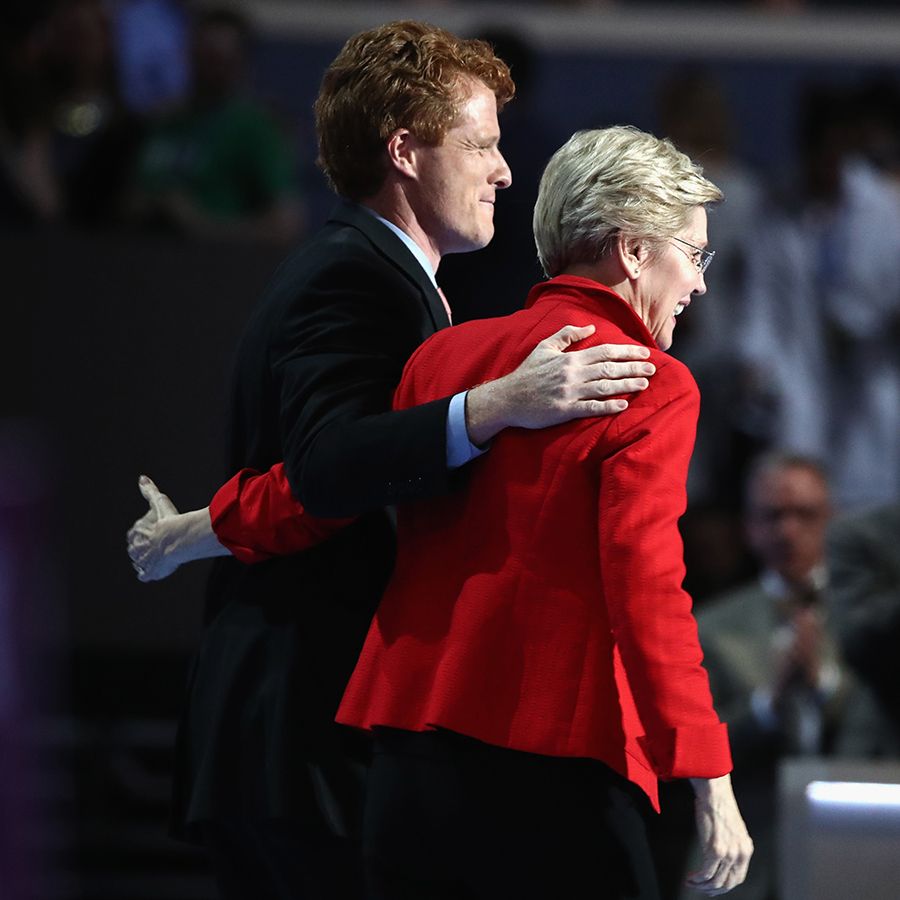
Kennedy and Senator Elizabeth Warren embrace at the2016 Democratic National Convention. / Photo by Jessica Kourkonis/Getty Images

Introducing Warren at the 2019 Lawrence rally where she kicked off her run for president. / Photo by Scott Eisen/Getty Images
Kennedy says he knew the race wouldn’t be easy, but he believed he could pull together a coalition of people who’d been left behind over the decades, or felt deliberately threatened in Trump’s America, and they could carry him to victory. Perhaps it could have worked, but several things got in the way. One was COVID, which, starting in March 2020, turned the race into a virtual one and took away what was probably JK3’s greatest strength: his retail campaigning chops and his ability to connect. Now, he was simply stuck in his living room, doing Zoom after Zoom after Zoom. Around the same time, the presidential campaigns of Elizabeth Warren and Bernie Sanders came to an end, which left a slew of climate-focused progressive activists and operatives with nothing to do—until they noticed Markey, coauthor of the Green New Deal, early advocate of Medicare for All. A coterie of them—many with sharp digital organizing skills—began to rally around him. Then, in late May 2020, came the murder of George Floyd, which set off a reckoning about race and privilege that was particularly acute in affluent, well-educated enclaves like Cambridge, Brookline, and Newton.
Finally, there was the basic political misreading of what the Kennedy name, 57 years after JFK’s death, 52 after RFK’s, 11 after Teddy’s, even meant to many people. “Younger voters—anyone under 50—don’t really get the Kennedy mystique,” says Thomas Whalen, a Boston University professor who’s written several books about the family. “To them, it’s just weird that people would put a picture of a Kennedy on the wall next to Jesus.”
The result of all of this was that the narrative around the Kennedy-Markey race—perhaps fittingly in this time of upside-down politics—got turned on its head: If JK3 hoped to be seen as a dynamic insurgent taking on a career politician, he instead started to be cast as the very symbol of privilege and entitlement—a Kennedy, for cripes’ sake, who seemed to think the waters should part so he could occupy the Senate seat his family thought they owned by divine right.
What became known as the “Markeyverse”—young, extremely online progressives with a deep commitment to battling climate change and racial injustice—leaned particularly heavily into the latter narrative, and as the weeks passed, in cahoots with the Markey campaign, it generated an endless stream of Tweets and posts and memes that celebrated Markey and trashed Kennedy. They fueled their cause with arguments that Kennedy had been the beneficiary of trusts invested in fossil fuel companies. His über-rich family was backing a PAC that was running negative TV spots against Markey. He had worked for a reactionary prosecutor, and he belonged to a fraternity at Stanford that had been founded by Robert E. Lee, which suggested he was…a racist. By the end of the summer, the campaign had gotten so nasty that Kennedy was receiving death threats. “My wife stopped getting the mail because we didn’t know where the packages were from,” he says.
Kennedy says he was prepared for a tough race: “It’s painful to see millions of dollars posted behind advertisements that aren’t true—things that are misleading and inaccurate and misrepresentations of who you are and how you’ve tried to live your life. That stinks, but…welcome to the NFL.” What he can’t quite get past, though, is what he sees as the glib fickleness of the left. “The part I still wrestle with is some of the allies I had on the left who all of a sudden flipped around—allegations that I was somehow a racist, all sorts of things. A month before I was their champion, now all of a sudden, I was the enemy. How does that work?”
By the time of the primary in September, the perception was locked in in places where it mattered: Ed Markey—despite having supported the Iraq War, despite having voted for the 1994 crime bill that helped set off mass incarceration—was the real progressive, while spoiled Joe Kennedy was a fraud. In the end, JK3 actually won many of the state’s more working-class communities—Fall River went for him 3 to 1—but was trounced in more affluent, progressive areas. Perhaps the Kennedy name still meant something to some people in some places, but among the affluent intelligentsia—his own tribe—JK3 was a villain.
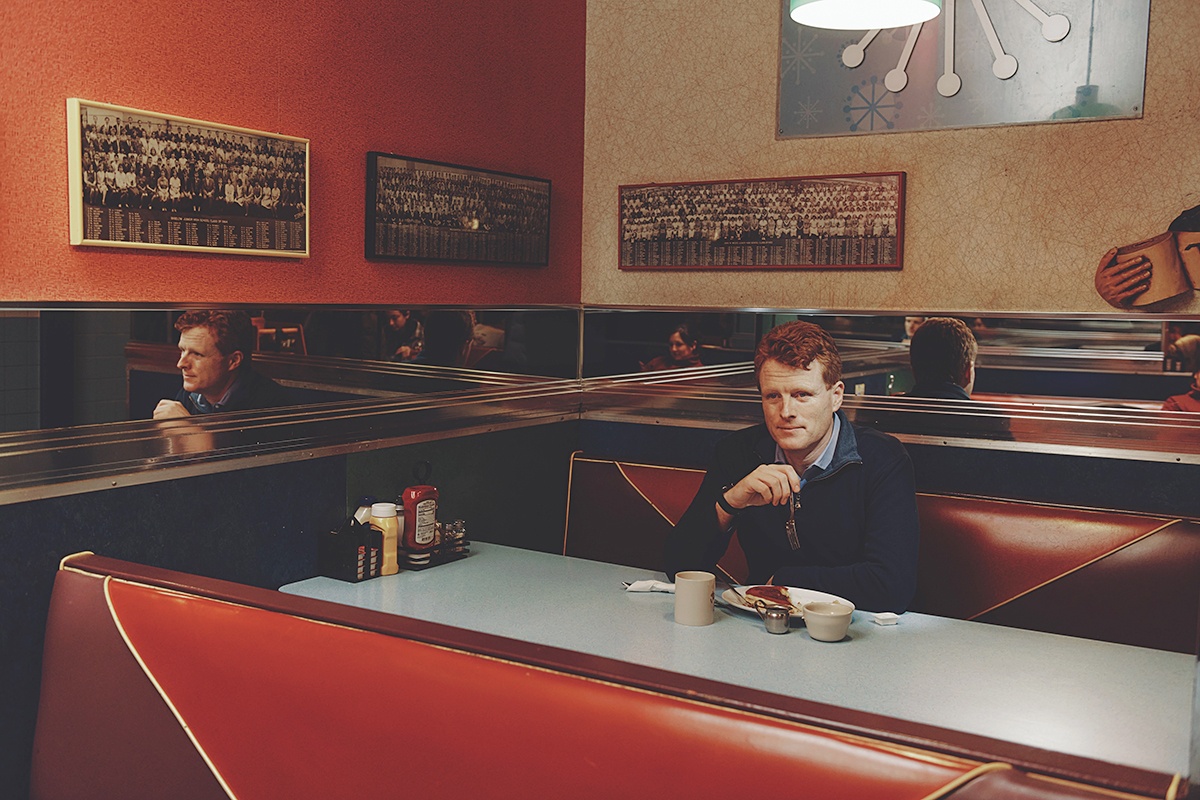
Photo by Tony Luong
In 2016, not long after Trump was elected the first time, Kennedy convened a town hall in Newton. For weeks, his progressive constituents had been approaching him, saying they simply didn’t understand how Americans anywhere could have voted for the Donald. Didn’t they understand he was taking advantage of them? That he was a con man? Kennedy and his team decided the best approach was to bring people together for a community conversation.
As he recalls it, he began by trying to validate people’s feelings and fears, vowing that he and others would fight against Trump; they’d stand with science, with women, with immigrants. But then he pivoted and suggested that maybe Democrats also needed to look in the mirror. How was it that arguably the most qualified candidate in presidential history, Hillary Clinton, had lost to a guy who, just weeks before, had revealed himself so clearly in the Access Hollywood tape? How was the election even close?
“I got creamed,” JK3 says of people’s reaction to his question. “Creamed.”
Eight years later, he acknowledges, in a thoughtful sort of way, that he misread people’s ability to self-reflect at that moment. But he’s more adamant than ever that, when it comes to understanding the country, the smarty-pants part of the Democratic Party has essentially lost the plot; if they want to turn back the tide of Trumpism, they need to make significant changes.
One change, he believes, is Democrats’ electoral strategy. For too long, national party honchos have focused all of their resources in big elections on a narrow set of swing states and swing Congressional districts. Those fundraisers and campaign appearances JK3 did for other candidates over the years? Nearly all were in big blue cities or competitive purple suburbs; almost none were in red America. He gets the strategy—those areas are the ones that decide presidential elections and control of Congress—but what does it say about Democrats that they don’t even try in huge sections of the country?
The advocacy organization Kennedy launched in 2021, the Groundwork Project, is, in a small way, an effort to change that dynamic. His theory is that red states and red districts aren’t lacking in good candidates; in fact, he believes they have plenty of them. What’s missing is any kind of organized way for those candidates to get their messages out to local voters. By this, he means not just a more robust Democratic Party in those places but more civic institutions and community groups that are actually at the heart of self-governance. “I lived more or less in Cambridge for the majority of my life,” he says. “You could drive a golf ball down Mass. Avenue in Cambridge and probably cross, in the course of flight, 15 different nonprofits and a gajillion people who are on the boards of those nonprofits.” These are people who are civically engaged—who both educate politicians about issues and help spread the word about candidates who get it.
Many parts of red America, he notes, are lacking in those kinds of institutions, in part because there isn’t the disposable income to fund them. The result is not only that Democrats can’t get their ideas out but also that the party writ large gets defined by Republicans (who, of course, paint Democrats in the scariest light possible).
Groundwork—which operates in Alabama, Mississippi, Oklahoma, and West Virginia—tries to create more civic infrastructure by offering grants and support to hyperlocal organizations in those areas. JK3 understands this is not a quick fix—what’s needed is time, and, as in Northern Ireland, people just getting on with it—but he believes in the potential. “You can make a huge impact on people’s everyday lives by investing in those places and making life better for them—rather than by putting everything into whether you’re going to be able to win Pennsylvania.”
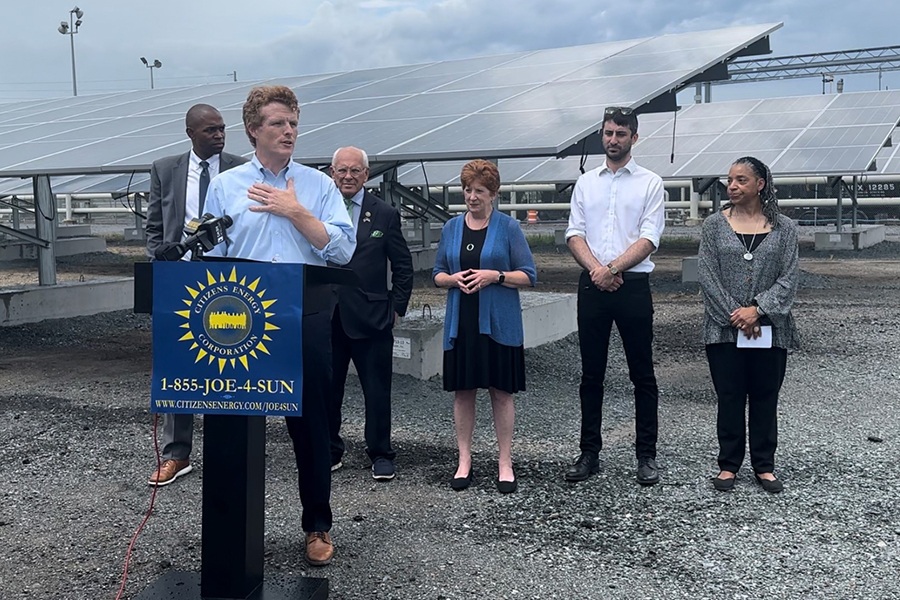
Since leaving office, Joe has served as president of Citizens Energy Corporation, the nonprofit organization his father, former Congressman Joe Kennedy II, founded. / Courtesy photo
But what ails the Democratic Party isn’t just infrastructure, Kennedy believes. More fundamental is that the well-educated, affluent, urban progressives who increasingly define the party—the types of people who, not for nothing, largely voted against Kennedy in 2020—are absurdly out of touch with how much of the rest of the country lives. He points to a topic he’s come to know well running Citizens Energy: renewable energy. “You go through Newton or Brookline, and you have all of these yard signs for renewable energy or solar energy, which kicks your energy cost up a couple of cents per kilowatt hour,” he says. “I’m one of them, and I’m, like, fine.
“But if you kick up the cost of energy a couple cents per kilowatt hour in Fall River, companies there—bonuses aren’t as big. Salaries aren’t as big. Kick it up more, and they move to Raleigh/Durham or Alabama or Georgia. It’s not that they don’t care about climate change. But it’s like, ‘I gotta feed my family.’”
The deeper point: Too often Democrats are obtuse to the impact their policies will have on people’s lives—or perhaps they simply don’t have much regard for how some Americans live their lives in the first place. This is the reality that Trump has tapped into, JK3 says. “Part of what he’s done very well is validate. In his first term, he woke up every morning and just started throwing punches. And his base loved him for it. Because finally, there was somebody who was willing to fight for them. Not explain why they’re wrong. Not compromise them. Finally, fight.”
JK3 is quick to note that, like his constituents eight years ago, he also sees this as a con. “He’s got billionaires throughout his cabinet that made money exploiting the very system he now says they’re going to destroy. No, they’re not. They didn’t before, and they’re not going to do it now.”
But the reason more than half the country is willing to bet on Trump is because they have even less trust in the Democratic Party.
JK3 tells me a story about a trip he took a few years ago to West Virginia. While he was there, he got a tour of a former brownfield that the community had turned into a park. The tour—led by a young guy with a beard down to his belly—finished up not far from a massive coal-fired power plant. When it was over, the guide said to Kennedy, “Hey, can you answer me a question? How come you Democrats think we don’t know how to work?”
JK3 asked him to say more.
“The only time you guys talk about West Virginia,” Kennedy recalls the young guy saying, “is when you say we need to be retrained. We got the hardest-working workforce in the world, the highest-skilled workforce in the world. We built the industrial might of this country. I don’t need you to tell me that coal mining is dangerous. Generations of my family did it. We sacrificed for our country, and we’re proud of what we built. So how about instead of telling us we need to be retrained, you start by saying thank you. And then say, how can we help determine what’s next for West Virginia?”
JK3 shakes his head. “He never said climate change wasn’t real. He never said we don’t need to be more aggressive about climate change. He just said, when you froth your latte in the morning, chances are—in many places—the energy for it came from the rock my family dug out of the ground. So say thank you and…like, help.”

Since leaving office, Joe attended a D-Day commemoration in his role as Special Envoy to Northern Ireland for Economic Affairs. / Courtesy photo
Trump: The Sequel has brought an end to Kennedy’s Northern Ireland assignment; with fewer trips across the ocean, he’ll be freed up, he says not unhappily, to devote more time to Citizens Energy. The nonprofit was founded by his father to help low-income people afford their oil heating bills. Today it operates for-profit businesses—mostly in renewable and solar energy—then uses those dollars to help low-income families with affordable energy access. Last year it gave away $8.6 million. Given America’s growing energy appetite—AI and crypto don’t power themselves—JK3 is bullish about how much the organization can grow and the impact it can make.
That said, his mind never seems far from the state of America in the mid-2020s. “I think there is in this moment,” he tells me, “a large-scale frustration among the American citizenry saying, ‘Hey, our government not only hasn’t been serving our interest, but there’s been a kind of capture by elitism across society that’s no longer in service to the country, it’s in service to yourselves.’ And that, in the grand scheme, is what—shockingly, disappointingly, heartbreakingly—Donald Trump has been able to put his finger on and been able to poke at and now says he needs to break.”
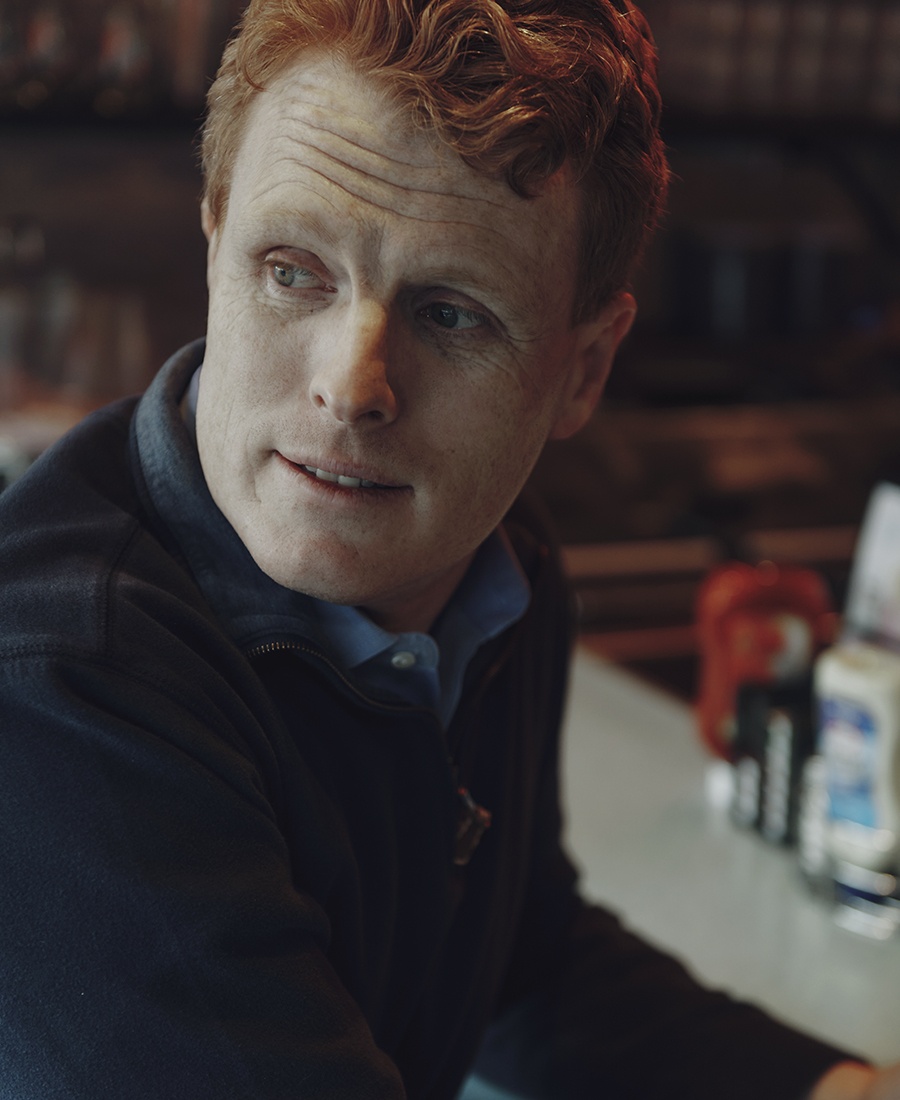
Photo by Tony Luong
I ask Kennedy if he’s ruled out running for office forever. “I wouldn’t say forever. Who knows what forever means?”
I ask JK3 if he’s ruled out running for office forever. “I wouldn’t say forever. Who knows what forever means?” He’s happy to have his weekends free in a way that he never did as a congressman, and isn’t eager to put his family through another rough campaign. “But I also understand that there’s a window here that I still have,” he says. “And seven years from now, my kids probably aren’t going to be nearly as excited to be spending time with me as they are at the moment.”
If he ever does run again, it will be because he thinks he brings something unique to a race—“a perspective I have that other folks wouldn’t necessarily bring to that position.” He says this as a nod to all the other political talent he sees in Massachusetts, but I can’t help thinking it’s an acknowledgment of something else, too: That in order to win, he’ll need more of a hook. Being a Kennedy wasn’t enough in 2020, and it never will be again. As BU’s Whalen puts it, “The Kennedy brand is done.” The rise of RFK Jr.? “This is the coda,” Whalen says. “The final gasp of a dying political dynasty.”
What a ride it’s been, huh? If you’ve been around long enough—or if you are, in fact, a Kennedy—there’s something sanguine about the end, despite all the tabloid stories and tragedies of the past few decades. Then again, if you’re a Kennedy, it might also be liberating. It means the rest of us might start to see your family the way you do—as just a family, fucked up or not. And it means that if you ever throw your hat in the political ring, you do so on the strength of your ideas and skills, not just your last name.
The great irony? If he ever did return as a candidate, JK3—an elite who understands to his core where his fellow elites have gone so terribly wrong—might actually have a shot at Making the Kennedys Great Again.
First published in the February 2025 print edition of Boston magazine with the headline, “The Kennedy Paradox.”
Previously
- Joe Kennedy III Wants You to Know He’s More Than Just a Name
- The Interview: Joe Kennedy III


